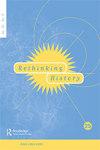The ethics of writing history in the traumatic afterlife of lynching
IF 0.5
2区 历史学
Q1 HISTORY
引用次数: 0
Abstract
ABSTRACT ‘The Ethics of Writing History in the Traumatic Afterlife of Lynching’ raises questions about the ethical obligations of historians who write about historical traumas like lynching, in particular when the subjects of their histories cannot give consent for their violent and deeply personal stories to be published in books and articles. This essay argues that, though historians are charged with unearthing the ‘truth’ of the past without whitewashing or tempering violence, bigotry, and the like, we also have an obligation to preserve the dignity and privacy of the victims and survivors of historical trauma. Some stories (or certain parts of stories), like those of Black women who were raped as part of a lynching ritual, may be legitimately unspeakable, especially given the real potential to veer into the gratuitous and threaten to re-objectify victims and retraumatize survivors. Expanding upon an essay by Teju Cole, ‘Death in the Browser Tab,’ that critiques the ease with which anyone can access videos of police shootings, this essay proposes strategies for forging ethical relationships with these historical subjects and navigating these difficult writing choices.私刑创伤后的历史书写伦理
摘要“私刑创伤后的历史书写伦理”提出了历史学家在私刑等历史创伤中的道德义务问题,尤其是当他们的历史主题无法同意将他们的暴力和深刻的个人故事发表在书籍和文章中时。这篇文章认为,尽管历史学家被指控在不粉饰或缓和暴力、偏执等的情况下挖掘过去的“真相”,但我们也有义务维护历史创伤受害者和幸存者的尊严和隐私。有些故事(或故事的某些部分),比如黑人女性在私刑仪式中被强奸的故事,可能是无法言说的,尤其是考虑到真正有可能转向无端的,并威胁要重新客观化受害者和重新伤害幸存者。特朱·科尔(Teju Cole)的一篇文章《浏览器标签中的死亡》(Death in the Browser Tab)批评了任何人都可以轻松访问警察枪击案的视频,这篇文章在这篇文章的基础上提出了与这些历史主题建立道德关系并驾驭这些艰难写作选择的策略。
本文章由计算机程序翻译,如有差异,请以英文原文为准。
求助全文
约1分钟内获得全文
求助全文
来源期刊

Rethinking History
Multiple-
CiteScore
1.20
自引率
0.00%
发文量
26
期刊介绍:
This acclaimed journal allows historians in a broad range of specialities to experiment with new ways of presenting and interpreting history. Rethinking History challenges the accepted ways of doing history and rethinks the traditional paradigms, providing a unique forum in which practitioners and theorists can debate and expand the boundaries of the discipline.
 求助内容:
求助内容: 应助结果提醒方式:
应助结果提醒方式:


